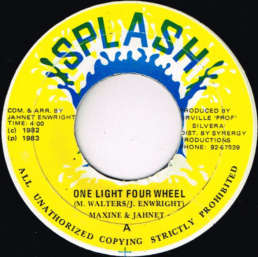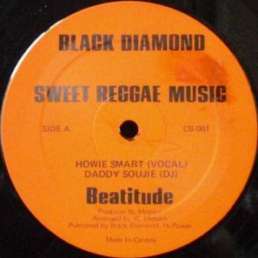There’s certainly no lack of transportation-focused reggae tunes, from the vintage “Mini Bus Driver” by Junior Reid to the modern “Bike Rider” by Mungo’s Hi Fi (ft. Pupajim). Given that, it’s safe to say that this extremely catchy duet from Maxine and Jahnet deserves to be appreciated by a wider audience. Crucially overlooked?
A cautionary tale from the early 80s atop a tough riddim, like many a memorable tune it stems from a specific moment that’s been transformed into something creatively far grander. In a circa 2016 interview with Never Apart magazine, lightly edited here, Maxine covers the context and back story of the song.
Can you tell us about the song “One Light Four Wheel?” How did that collaboration with Jahnet Enright come about, and given its success, how come you didn’t pursue doing more music after that?
Yellow Man was my hero at the time; I was also doing appearances at tourist events, promoting my sarongs by deejaying over a track while my models demonstrated 21 ways to wear a sarong. One of the girls commented on a dangerous car with one light, which nearly crashed into us one night, as a ‘one light four wheel.’ I was so taken with the phrase, that I went home and wrote a song about it. I then took the song to my friend Jahnet Enright, who had written and produced Michigan & Smiley, and she wrote the music, tidied up the song, engaged Sly & Robbie, and off we went to Channel One studios and recorded the track.
It was an instant winner with its distinctive soundtrack, but I was soon on to the next thing… I didn’t pursue a career as a singer as really I can’t sing, and simply did that song as I felt good about it, and in the manner of the dancehall, wanted to bring the dangers of cars with one light only to public attention. I remember being particularly overjoyed when I went to court about a traffic ticket some years later and heard the judge berating a man who had been charged with driving with one light only as having a ‘one light four wheel.’
As the mention of Michigan & Smiley should have indicated, there’s depth to both Maxine and Jahnet, despite seeming to be obscurities per Discogs. That’s perhaps true from a recorded music perspective, but the reality is both have made major contributions to the development and appreciation of Jamaican music, making this unlikely one-off pairing that much more of a gem.
Maxine, aka Maxine Walters, is a leading curator of dancehall culture as well as Jamaican street art at large. She’s a versatile voice within music culture, having previously worked in concert promotion (notably for the band Third World); in 2016, she published a limited-edition book showcasing her art collection, Serious Things a Go Happen: Three Decades of Jamaican Dancehall Signs.
Jahnet, better known as Janet Enright, is known as a truly pioneering jazz guitarist in Jamaica during the 50s and 60s, playing along with legends like Louise Bennett, Eric Deans, and Don Drummond, and supporting touring international artists like Dave Brubeck for their Jamaican gigs. The societal recognition of her skill and talent can hardly be understated given how male-dominated the Jamaican music industry was during her prominence. While there’s a lack of recordings, that’s really due to the recording realities of the era combined with her rightful reputation as a live performer, rather than ability or importance.
Quality used 7” copies seem to be regularly available for modest prices, including through vendors like Discogs, ReggaeCollector.com and Deadly Dragon.
The Groove Thief
.the future of dub is the present.
Exclusive Reviews + Interviews // Facebook // Mixcloud (Archive) // SoundCloud
Co-Founder: Pomegranate Sounds
Owner/Operator: Pomegranate Hi Fi
Writer: NiceUp
Editor: Global Reggae Charts Magazine


